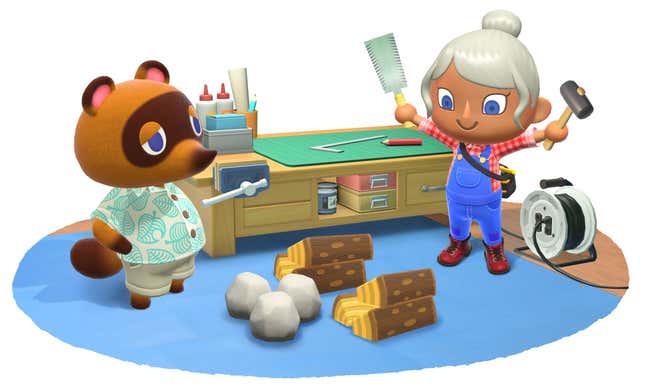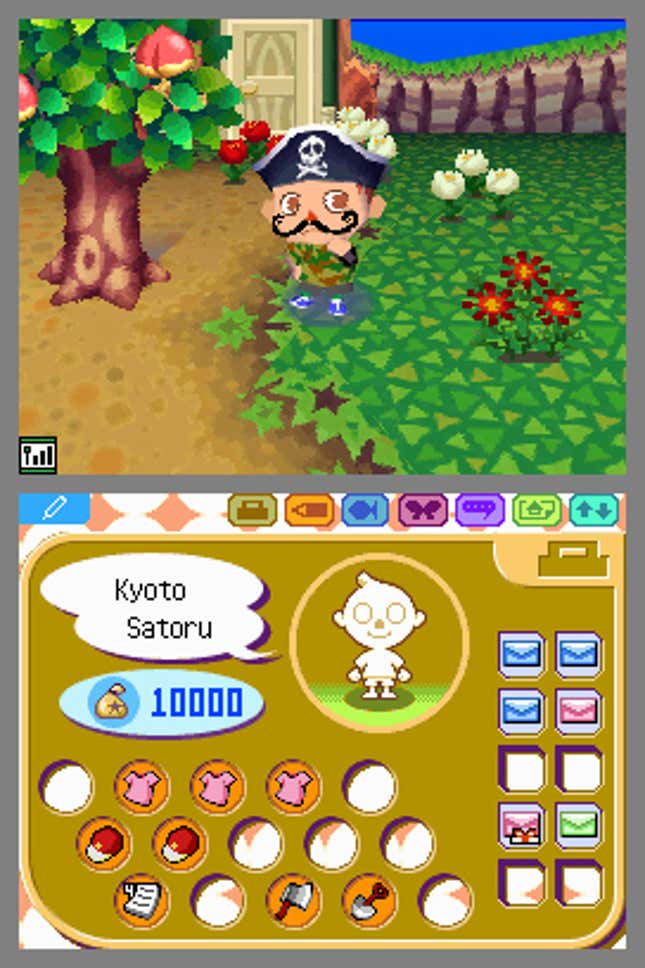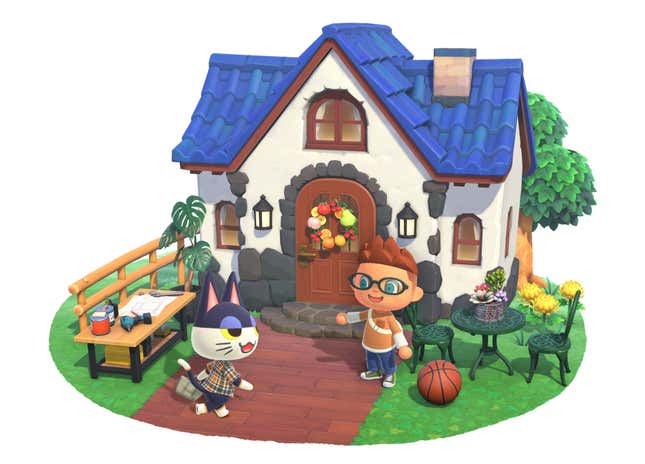
Much of the time, but especially right now, the world doesn’t feel like it makes a whole lot of sense. It’s chaotic, it’s unpredictable, and things always seem to come up that completely derail the best-made plans. I learned that as a kid by playing Animal Crossing, a game that, much like life, doesn’t have a perfect outcome.
On March 20, millions of grown adults like me will pay $60 for a game that’s just a cuter version of the boring stuff they already do all day. What makes Animal Crossing so appealing? There’s something about its nature—carefree, soothing, directionless—that really strikes a chord with players of all ages.
If there was any other game to which you could compare Animal Crossing, it’d be something like Second Life or The Sims. But where those alternate realities are a place for players to live out wild fantasies without consequences, Animal Crossing’s appeal has always been the opposite: Live out a fairly mundane day-to-day life.
You’re a villager living in a town with anthropomorphic animals, and that’s kind of it. Sure, there are a number of things that you can do in Animal Crossing—slowly fill the museum with fossils you’ve dug up around town, befriend villagers by helping them run errands, buy matching furniture sets—but at the end of the day, its only demand is that you participate.
If Animal Crossing has one rule, it’s that time moves at the same speed as the real world. In fact, Animal Crossing actively discourages players who try to race through it to do things as quickly and perfectly as possible.
Quit without saving because you regret spending all of your money on a new shirt? A furious mole rat will chew you out the next time you try to leave your house. Think you’re clever for setting your console date to August so you can compete in the bug-catching festival? You’ll find that your favorite villagers have moved away and your town is covered in weeds.
The forced immersion was difficult to accept when I was first introduced to Animal Crossing: Wild World on the Nintendo DS when I was 10. My experience with gaming up to that point had been limited to more straightforward games like Mario Kart and Pokémon, where the goals were clear-cut. You had to be the fastest and the strongest.

“When we play games, we’re immediately and constantly focused on a goal,” wrote author and game designer Jane McGonigal in 2015. A game’s goal, she wrote, “focuses our attention and creates a sense of motivation and determination.” Certainly for me at 10 years old, that’s where the fun was—winning in ways that weren’t possible in my day-to-day life.
Animal Crossing didn’t let me dominate its world like I expected to. At first, I tried to take control back. I spent hours researching online so that I could make my villager have the specific haircut I wanted. (You have to answer Kappa’s questions in the right order as he drives you in his cab to your village.), I studied the fastest ways to rack up cash. I set my DS’s internal clock date a week forward so I could participate in that bug-catching competition. It took a lot of guilt-ridden weed picking afterward to get me to realize that Animal Crossing was so much more rewarding when I finally surrendered to its leisurely randomness.
That’s because the secret ingredient that makes Animal Crossing’s mundanity so much fun is the element of random chance. It’s a rush to spend months looking for a specific, elusive piece of furniture and finally see it in Tom Nook’s store. But if it doesn’t work out right away, there’s no punishment, either. With no way to win or lose, the only objective is to pass the time in a way you think is enjoyable. You have total freedom to do as little or as much as you want.
Animal Crossing: Wild World felt closer to the real world than anything 10-year-old me had played before. Do-overs were discouraged. Imperfection was inevitable. And yet somehow, Animal Crossing found a way to make paying off a mortgage seem fun. Spending hours holed up in my room, I started imagining that this would be what being an adult would be like. I looked forward to making my own money, buying my own stuff, maintaining my own friendships.
Having graduated from college in 2018, I am here to tell you that real life is actually not exactly the same as Animal Crossing. School has a comfortable structure: semesters, finals, and summer breaks give life a recognizable cadence. Report cards let you know how you did. Leaving that system to start working is exciting, but also very daunting. There’s no longer a concrete way to measure progress and failure, which brings the anxiety of not knowing if things are going well or not.
With this week’s long-awaited release of Animal Crossing: New Horizons on everyone’s minds, I’m looking back at the series for comfort during uncertain times. What better to combat the fear of the meaningless void than a game that doesn’t really have a story or a way to win?

Recently, I moved into a single room for the first time—in real life, that is. It had been my dream for so long to get a chance to pick my own furniture, but suddenly the prospect of dropping hundreds of dollars and lugging giant pieces of wood up a flight of stairs wasn’t as appealing as it once was. Amidst bills, work, and the general stress of adult life, I had lost sight of the fun.
That’s where a game like Animal Crossing comes in. It doesn’t reject uncertainty—it embraces it, and turns it into a way to make the game that much more fun. It’s unusual for such a successful game series. To be sure, there are self-motivated projects that you can choose to take on, but you can just as easily move on without any negative consequences. There aren’t any perfect streaks. Chance encounters mean that everybody’s gaming experience will be different.
By not imposing any clear-cut objectives, Animal Crossing grants us permission to shape our own experiences much like in the real world. Except, of course, everything is a lot cuter and a lot less scary. It’s a smaller, more manageable way to navigate the choices that we face in day-to-day life.
My room looks great now. Yes, it sucked to spend so much money, and more than once I had to ask my neighbors to help me lug an Ikea package up the stairs. No, everything doesn’t look perfect, and there were plenty of missteps along the way. But as I thought about how excited my 10-year-old self would have been to pick out her own furniture, I started to feel grateful and proud of all of the progress I’d made since I first picked up Wild World.
There’s comfort in breaking down the scary and unknown. For newly independent adults, Animal Crossing is one way to handle the seemingly infinite possibilities that overwhelm us every day. In the game as well as in real life, we learn that it’s important to take time, make the best of random experiences, and prioritize what’s important to us.